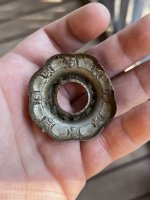old man
Bronze Member
- Thread starter
- #21
Cornelius,
Your in box is full on this site and I don't have your personal e-mail address. If you send it to me, I will forward the information that you requested. Also, you might want to think about appointing an assistant that you know or trust in the USA. If you aren't going to be back here until the summer, you might want to think about sending a recon team in the next month or in May to bring you some artifacts from the wreck to date. Only a suggestion. Plus it will keep the interest up on your project Virginia Gold.
Old Man
Your in box is full on this site and I don't have your personal e-mail address. If you send it to me, I will forward the information that you requested. Also, you might want to think about appointing an assistant that you know or trust in the USA. If you aren't going to be back here until the summer, you might want to think about sending a recon team in the next month or in May to bring you some artifacts from the wreck to date. Only a suggestion. Plus it will keep the interest up on your project Virginia Gold.
Old Man




 I hope you'll be able to join us. I'd like to try out your cooking!
I hope you'll be able to join us. I'd like to try out your cooking!

